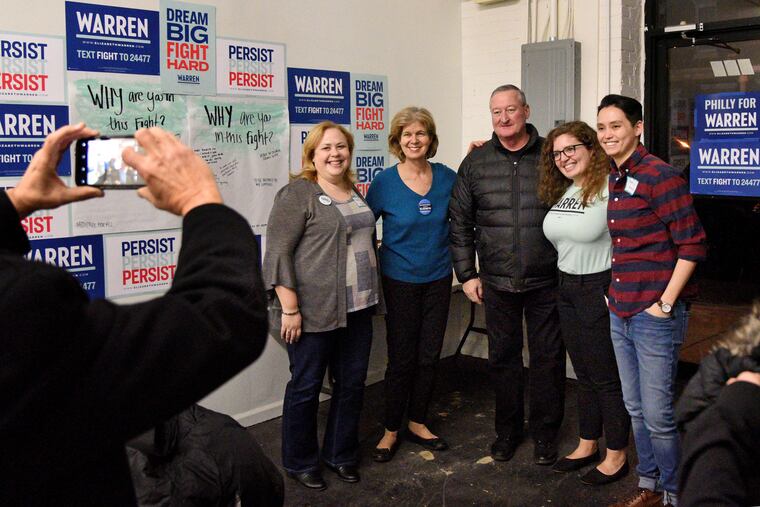Philly city workers have been barred from working on political campaigns for 70 years. Should that change?
Philadelphia’s 25,000-person workforce is currently prohibited from volunteering with political campaigns. A question on the June primary ballot would change that.

Ellen Mattleman Kaplan retired as the city’s chief integrity officer in February partly because she had her eye on the presidential election and wanted to be able to volunteer for political campaigns.
Kaplan, a registered Democrat, had given that up when she took the job in Mayor Jim Kenney’s administration in 2016. The city charter prohibits employees, except for elected officials and City Council staff, from working on campaigns.
It’s one of the toughest restrictions in the nation. Most other big cities allow employees to volunteer on their own time. Now, Philadelphia could join them if voters approve a charter amendment on the June 2 primary ballot.
For seven decades, city workers have been barred from campaign activity as a hedge against political corruption. The proposed change has not yet drawn any significant opposition.
“There are so many issues the city deals with that depend so heavily on decisions made by elected officials both on the state and the federal level," Kaplan said. “It was a great frustration among many people that they we were not permitted to participate in their election in our off-duty time."
The amendment would allow city employees to work on state and federal campaigns as long as they are unpaid and don’t have managerial roles. Workers in law enforcement offices and the City Commissioners office, which runs elections, would still be barred. The city’s prohibition on political fund-raising by employees would remain.
Currently, city employees can make political contributions and attend political events but can’t volunteer directly. The exception is City Council staff, who long ago were exempted from most rules governing political activity, given that their jobs are so closely tied to the elected official they work for.
City Council employees can also volunteer for political parties or become ward leaders or committee people, unlike all other city employees. Other city workers would continue to be barred from party work under the proposed charter amendment.
Councilmember Derek Green sponsored the legislation for the ballot measure, which passed in February, after hearing from employees concerned that they couldn’t help campaigns in the November election. Green said he thinks the current restrictions could violate the First Amendment.
“Unfortunately, because activity restrictions are so tight, you have city employees who believe they can’t sign a petition outside of the grocery store,” Green said.
Jane Slusser, former chief of staff to Kenney, who now runs Organizing Together 2020, a national progressive group dedicated to training volunteers to defeat President Donald Trump, said the ban on volunteering was hard for her four years ago.
“I wasn’t able to knock on a single door or make a single phone call," Slusser said. "And everyone wants to play by the rules, but especially after 2016 there was such an increase in political activism everywhere. City employees weren’t any different in terms of wanting to be involved, but they couldn’t.”
Under the proposed amendment, employees could volunteer on state and federal campaigns, but not city ones — or even for state legislators with city districts. The city’s Board of Ethics announced support for the proposed amendment last week.
The amendment also raises the penalties from $300 to up to $2,000 for violations, giving enforcement more teeth. Still, should it pass, Board of Ethics executive director Shane Creamer said, he is concerned about educating employees on new rules before Nov. 3.
“When you have an absolute prohibition, it’s easy to follow that rule, but if you’re able to stick your toe in or one leg in — then that makes it trickier," Creamer said.
He said he’s also worried that employees could be coerced by supervisors or elected officials to volunteer for favored campaigns.
That’s part of the reason for the original prohibition in 1951, after decades of machine control of government and elections.
“Hundreds, if not thousands, of employees were being wielded through the political machinery for the sake of retaining power," said Pat Christmas, policy director for the Committee of Seventy, a good-government advocacy group. "While Philadelphia still has numerous significant challenges with regard to public corruption, the concerns [now] pale in comparison.” The Committee is also backing the charter amendment.
Voters have passed almost all proposed charter changes by 2-1 ratios. A telling exception: attempts to get rid of Philadelphia’s requirement that elected officials resign to run for higher office, both of which failed.
“It’ll be interesting how the electorate will react to this question," said Christmas. "You think folks never read these questions, they don’t bother with them, but the electorate smelled something about resign-to-run and changed the way they voted.”